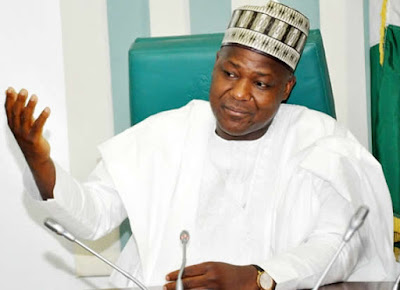
Speaker of the House of Representatives, Yakubu Dogara, has said it is unacceptable that Nigerians spend 5 billion dollars to fuel generators annually, declaring that the House of Representatives will support the Executive to find a permanent solution to the power problem in Nigeria.
He also explained that the House of Representatives is reviewing some of Nigeria’s energy laws in order to provide an appropriate legal framework that will facilitate the exploitation of renewable energy to benefit the Nigerian economy.
He said, “Power is arguably the single most important driver of the national economy. Indeed, it is difficult if not impossible to imagine modern life without power. Our industries and factories need electricity to run; and so do our offices, homes and businesses. “It is estimated that Nigerians spend about $5 billion US Dollars yearly to fuel their generators. This is an unacceptable situation and the House of Representatives stands ready to support the Executive arm of government to put a stop to this state of affairs.
“Renewable energy is a source of clean energy which is environmentally friendly and is crucial to the economy of the future. We can only be self-sufficient in the energy field when we combine all of our energy resources such as wind, solar, hydro, biomass, bio-fuel, landfill, sewage gas, solid waste, geothermal energy, ocean energy etc. Renewable energy sources are natural and often replenishes itself. Nigeria needs to invest more in renewable energy as fossil fuel is a diminishing asset. “An appropriate legal framework to exploit renewable energy which is nature’s gift to mankind is not adequate in Nigeria.
This makes it difficult to organise the sector in a commercially viable matter. Herein lies the merit and strength of this Bill under consideration,” the Speaker said.
The three bills are: (i.) A Bill for an Act to provide for the utilisation, sustainability and adequate supply of renewable energy for electricity and heat generation and for other related matters. ii.A Bill for an act to amend the National Electricity Regulatory Commission metre reading, billing and cash collection and credit management for electricity supplies and regulations to address matters relating to outstanding liability of electric bills in rented apartments. iii. A Bill for an Act to amend the Electric Power Sector Reform Act to reposition the Nigerian Electricity Regulatory Commission for effective service delivery and for related matters.
The House, had on inception of the 8th House of Representatives, committed itself in its Legislative Agenda (2015 – 2019) to devise a “Legislative Initiative on Power: The House shall take legislative action to tackle Nigeria’s energy crisis that has led to a general collapse of industries and businesses and inflicted hardship on citizens.
Legislative measures to support improved generation and distribution of electricity to homes and businesses will be encouraged”.








 Similar topics (5)
Similar topics (5)